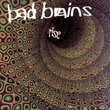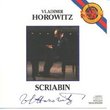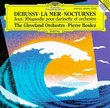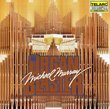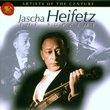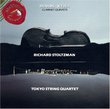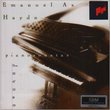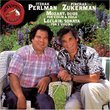| All Artists: Frederic Chopin, Sergey Rachmaninov, Robert Schumann, Franz Liszt, Domenico Scarlatti, Ludwig van Beethoven, Franz [Vienna] Schubert, Claude Debussy, Alexander Scriabin, Vladimir Horowitz Title: Vladimir Horowitz, Complete Masterworks Recordings 1962-1973, Vol. I: The Studio Recordings 1962-63 Members Wishing: 0 Total Copies: 0 Label: Sony Original Release Date: 1/1/1962 Re-Release Date: 7/19/1994 Genre: Classical Styles: Forms & Genres, Short Forms, Sonatas, Historical Periods, Baroque (c.1600-1750), Classical (c.1770-1830), Modern, 20th, & 21st Century, Romantic (c.1820-1910) Number of Discs: 2 SwapaCD Credits: 2 UPC: 074645345727 |
Search - Frederic Chopin, Sergey Rachmaninov, Robert Schumann :: Vladimir Horowitz, Complete Masterworks Recordings 1962-1973, Vol. I: The Studio Recordings 1962-63
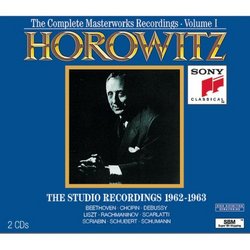 | Frederic Chopin, Sergey Rachmaninov, Robert Schumann Vladimir Horowitz, Complete Masterworks Recordings 1962-1973, Vol. I: The Studio Recordings 1962-63 Genre: Classical
This collection features wide-ranging repertory, including Russian Romantics like Rachmaninoff and Scriabin that were Horowitz's concert staples, all stunningly played. The Chopin "Funeral March" Sonata is taken at a flowi... more » |
Larger Image |
CD DetailsSynopsis
Amazon.com essential recording This collection features wide-ranging repertory, including Russian Romantics like Rachmaninoff and Scriabin that were Horowitz's concert staples, all stunningly played. The Chopin "Funeral March" Sonata is taken at a flowing pace, with a crisp, touching march. Schumann's Kinderszenen is fetchingly done with disarming simplicity and heartfelt poetry. He "improves" Liszt's 19th Hungarian Rhapsody with doubling and rewriting, but it's no less exciting for all that. A stylish Beethoven "Pathetique" Sonata is treasurable for singing tone reined into a classical framework. A good overview of Horowitz's style and repertory with many delights. --Dan Davis Similar CDs
Similarly Requested CDs |
CD ReviewsHorowitz at his Musical and Technical Prime Hank Drake | Cleveland, OH United States | 01/06/2003 (5 out of 5 stars) "Volume One of Sony's reissue of Vladimir Horowitz's Complete Columbia Masterworks Recordings contains studio recordings from 1962-63. His first three LPs for Columbia (Columbia Presents Vladimir Horowitz, The Sound of Horowitz, and In His First Recordings of...) were conceived as mini-recitals and have been carefully resequenced to fill two CDs. By 1962, Horowitz had not performed in public for nine years. Frustrated with the repertoire restrictions, poor sound and lack of marketing he was receiving from RCA, he abandoned Little Nipper and signed on with Columbia Masterworks, headed by the legendary Goddard Lieberson. Thomas Frost was assigned as Horowitz's producer, and the two clicked immediately. The fine results they obtained can be heard here. For decades Horowitz had a problematic relationship with Chopin's Second Sonata. A 1936 attempt to record the piece was aborted due to the pianist's first nervous breakdown (the first movement survives). Horowitz's 1950 recording for RCA is a bizarre collection of details, with a Funeral March that sounds like a Russian boat song on steroids. This 1962 recording is highly successful, however. Horowitz is obviously on top of the piece, technically, with his spare pedaling highlighting Chopin's use of counterpoint. The Funeral March is, for once, played with a crisp rhythm, the central section exquisitely balanced. He performed this work several times in the 1970s, but not as convincingly. The other Chopin works fare as well, including a passionate "Revolutionary" Etude and a tightly controlled B-minor Scherzo with a characteristically Horowitzian touch: Interlocking octaves replace Chopin's chromatic scales in the coda. Schumann was Horowitz's favorite German composer. Here we have a swift Arabeske, painted in delicate watercolors, and a reflective Kinderscenen, featuring some remarkable voicing. Less successful is the Toccata, which is pianistically unstable and was spliced together virtually bar-by-bar (this remastering smoothes out the edits much better than previous issues). Horowitz was less fond of Beethoven. He admired the Master's musical ideas and architecture, but was frustrated by Beethoven's piano writing, and many of Horowitz's Beethoven recordings are not convincing--although none could be classified as "bad." This version of the Pathétique (the only Sonata named by Beethoven himself) is one of the best ones, with a perfectly paced opening movement, a beautifully weighted Andante, and an unrushed Finale. Likewise with the lovingly voiced Schubert Impromptu, which is a great improvement over his 1953 recording which was performed in the wrong key! Horowitz seldom played Debussy and recorded no Ravel. One wonders why, listening to the three Debussy Preludes from Book II included here. Horowitz's ability to control the lower levels of dynamics, playing soft-softer-softest, and his deft tone painting suit this music perfectly. Of course, no Horowitz recital would be complete without Scarlatti, Scriabin and Rachmaninoff. The three Scarlatti Sonatas document Horowitz's increasing concern with authenticity, coupled with his ability to play with infinite grades of detachment and color. The Rachmaninoff and Scriabin illustrate Horowitz's huge dynamic range and unique understanding of Russian rhetoric. Liszt's Hungarian Rhapsody No. 19 is a rather monotonous piece in the original version, but Horowitz's arrangement of it here unquestionably improves the piece. Not only is the work more spectacular with Horowitz's additions, but the pianist's editing makes the structure more coherent. This was originally the last piece on the first LP he made for Columbia, and it's obvious his intent was to show that although he had mellowed and matured, he could still play "like Horowitz" when he chose. He proved his point. These recordings were produced at Columbia's legendary 30th Street Studio (actually a converted church) and the "360-degree" sound was widely praised in its day. The remastering has opened up the dynamics, and brought forth a fuller, more natural sound, reducing noise without overly capping the high frequencies." Delightful First Volume Michael B. Richman | Portland, Maine USA | 11/12/2000 (5 out of 5 stars) ""The Studio Recordings 1962-1963" is the first of Vladimir Horowitz's incredible nine CD volumes of the Complete Masterworks Recordings, which are available individually or as a boxed set. Volume One features solo piano works by an amazing array of composers -- Beethoven, Chopin, Debussy, Liszt, Rachmaninov, Scarlatti, Scriabin, Schubert and Schumann. Several of these pieces I was not familiar with prior to purchasing this disc, especially Schumann's "Kinderszenen" and Horowitz's own transcription for Liszt's Hungarian Rhapsody No. 19, and they are wonderful additions to my collection. Some of the other pieces I do have other versions of, and it is delightful to hear the subtle differences in Horowitz's style and interpretation. I always thought Rubinstein was the best at playing Chopin, but Horowitz really gives him a run for his money. The Etudes and the Scherzo are played like they are Horowitz's old friends, and the "Funeral March" flows beautifully between the somber and revelatory passages. I might even have to give Horowitz's rendition the nod over Van Cliburn's version (see my review of that title). Horowitz handles Debussy's three Preludes (from Book II) with all the majesty of Walter Gieseking's classic recordings. And Horowitz's reading of Beethoven's "Pathetique" Sonata is equal, if not superior, to the version by Daniel Barenboim that is coupled with Tchaikovsky's "Pathetique" Symphony. Finally, Horowitz captures three Scarlatti sonatas (not featured on Volume 2) in the brilliant manner that only he could. This two-disc set is an essential purchase for the new and veteran classical music fan alike."
|

 Track Listings (22) - Disc #1
Track Listings (22) - Disc #1